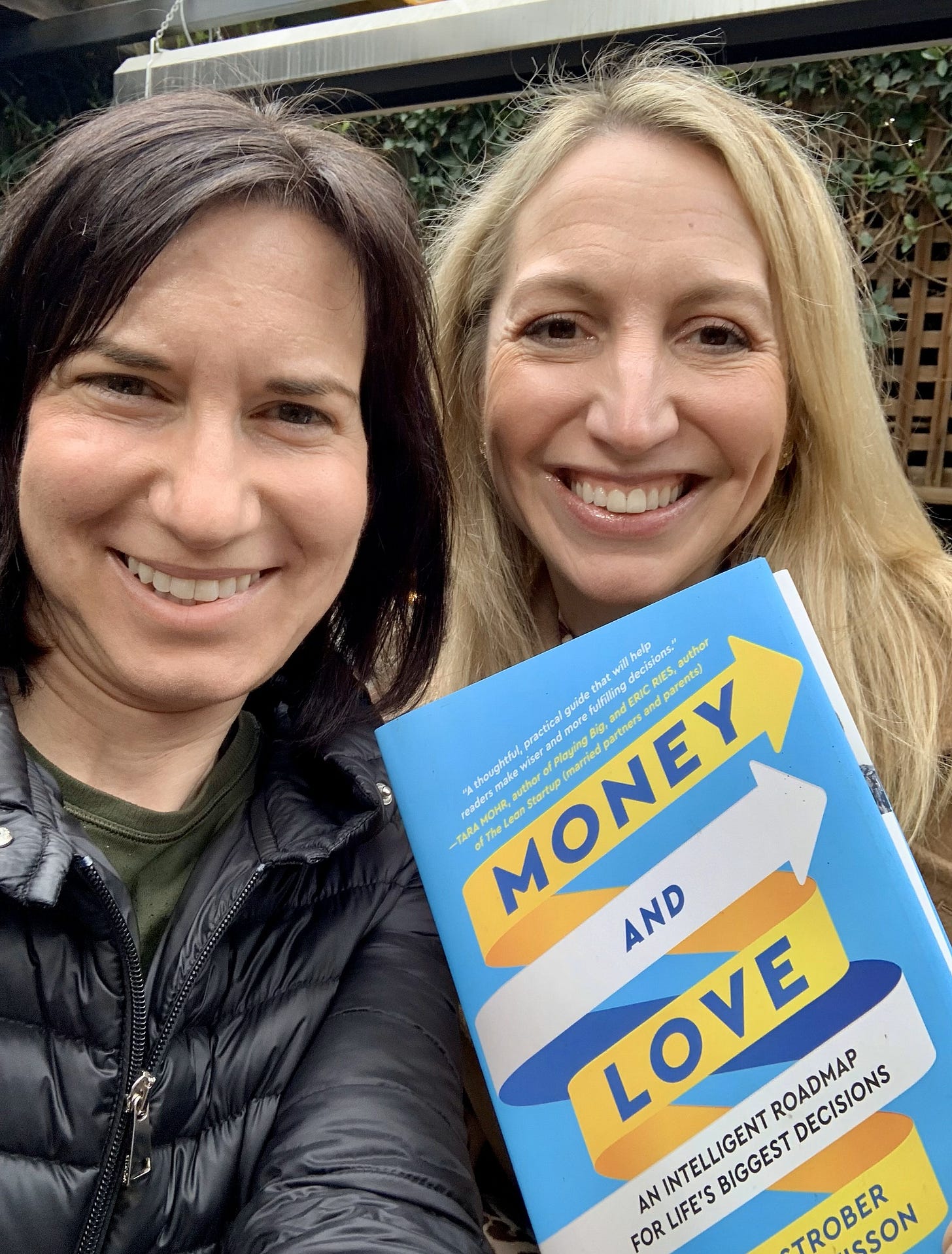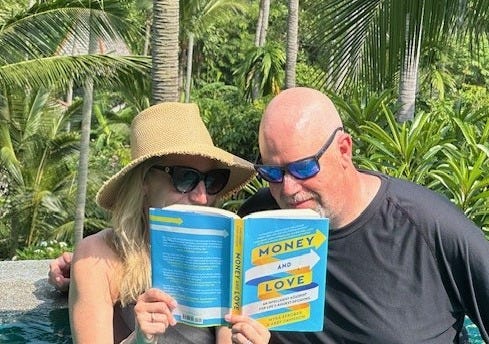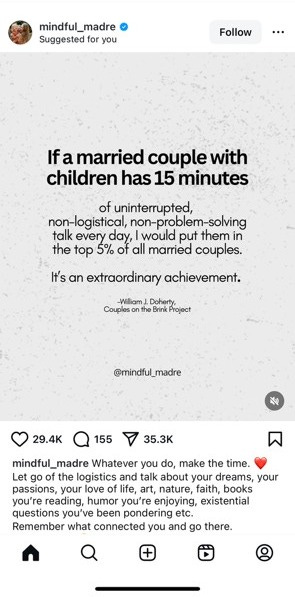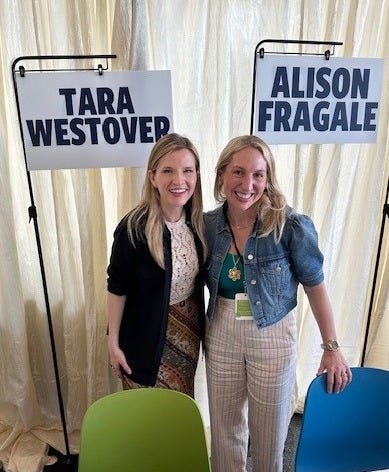This morning I spoke at an award ceremony at my high school.* My high school classmate is now the president of the school so he invited me to play the role of “distinguished graduate” and impart some humorous wisdom to kids who are the age of my own children. Very surreal, especially for a Monday.
In preparation, I did spend some time waxing nostalgic about the glory days (1989-1993) which led me to come up with my list of “Top 5 things I wish I knew in high school”:
If your parents stress you out, it’s not their intention. They are just profoundly invested in your current and future happiness.
That said, no one cares about your life more than you do. Not even your mom. Don’t expect other people to advocate for your best interests, learn to advocate for yourself.
The things that don’t turn out the way you plan are the foundation of an interesting life. To quote the band AJR: “100 bad days make 100 good stories. 100 good stories make me interesting at parties.”
You will get nicer as you get older, so you might as well start now.
Going through life with another person, even one you love, is harder than you think. Choose wisely.
I won the “husband lottery”
I didn’t meet my husband in high school, if that’s where you think this story is headed.
I met him when I was a 25-year-old graduate student getting my PhD. My husband was also a graduate student in a different program at the same school, although much older—27.
The story of our first meeting involves a collapsed lung, a birthday party, and a Neil Diamond cover band.**
For our first date my husband invited me to an on-campus Thai food court, then had me to pay for my own meal—a fact that I’ve enjoyed pointing out at every opportunity for the past 25 years.
On our second date I outlined a list of requirements for anyone who wanted to apply to be my husband:
1. Must know how to drive stick shift (so that he could drive my car as needed)
2. Must be at least 5’9” (so that he was as tall as I was in heels)
3. Must know how to play guitar (cause it’s just cool)
4. Must be willing to get married in Las Vegas (my happy place)
When I finished, he asked me just one question: “Where are you from?”
“Pittsburgh,” I told him.
“Well, I’ve never thought much about it,” he said, “but I guess I always assumed I would get married in my wife’s hometown. So if you’re telling me my choice is Pittsburgh or Vegas, I’m good with Vegas.”
Five years later we did get married—in Las Vegas. And at our rehearsal dinner my husband surprised me by playing one song (barely) on the guitar—Margaritaville by Jimmy Buffet—just so that he could get a perfect score on my list of husband requirements. #overachiever
Dating for five years was a long time in comparison to the courtships of our friends, so I assumed that I knew my husband well. I knew he liked NFL football (positive) and didn’t like sushi (negative). He made me laugh, had a great career, and seemed equally committed to supporting my career. We had lived together for a few years, as well. All in all, I thought I had done my due diligence.
Looking back, though, there was a LOT we had never fully discussed, like:
Did we want kids, how many, and what were our views on educating and raising them?
How much money was “enough” to live our ideal life, and how would we spend it?
Where did we want to live, and what career goals, if any, would we sacrifice for a more desirable location?
What relationships did we want with our families, and how would we care for our parents when they aged?
We didn’t discuss these things because it never occurred to us that we should. All we had was a young person’s naivete that if you loved someone the rest of it would “just work out.”
Fortunately for us, it largely has. Fast forward 19 years, three kids, three states, four dogs and four houses later and we’ve managed to confront all these decisions without much conflict. This is only because I’ve won the “husband lottery”—the term my dear friend uses to describe both of our spouses. My husband is an easy-going, rarely-rattled, quick-to-forgive guy, even when I frequently make big moves without consulting him (did I mention we got a new puppy this week?).
Money & Love to the rescue
Money & Love: An Intelligent Roadmap for Life’s Biggest Decisions was written by Abby Davisson and Myra Strober. It was the outgrowth of a class that Myra taught (and Abby took) at the same graduate school where my husband and I met—Stanford University’s Graduate School of Business. However, neither my husband nor I knew about the class until I became friends with Abby through a book authors’ group, long after we had graduated.
As the title suggests, the book outlines a framework for making big life decisions in collaboration with a partner. Although I wish I’d had this book 25 years ago, I also realized its potential to help my husband and I make better decisions together from this point forward. So I told my husband that we were going to do our own little book club together and discuss the book. And yes, I do appreciate the irony that I made a unilateral decision about how we should learn to make more collaborative decisions.
My husband is still reading, but based on my own read of the book as well as a great conversation/personal coaching session I had with Abby over brunch, I offer you another Top 5 list (this time in no particular order):
My “Top 5 tips for making better decisions with your partner”
1. The best time to have a conversation with a new partner about money is before you take your first trip together: This great advice came way too late to help me, but I offer it here for anyone out there who might be in a new relationship in the future. Traveling together brings up lots of money issues like setting a budget, selecting lodging and activities, and splitting expenses. Vacation planning gives you a natural opportunity to start talking about your priorities.
2. Clarity is key: You can’t make good decisions until you know what matters most. Although we think that what’s most important to us is obvious, it’s often not. When I asked Abby about what she most wanted at this point in life, she answered instantly: “Radical autonomy.” However, she only uncovered that priority as she and her husband initially pursued what they thought they most wanted—a bigger house. As they were house hunting for more space for their family of four, they calculated the financial implications of a new home and realized that a bigger house, although exciting, would tether them to their corporate paychecks for many years, which neither of them wanted. The housing search made them realize that what they both wanted most was to be entrepreneurs and to spend more time with their kids, so they passed on the bigger house and started discussing how they could both quit their jobs and start their own businesses.
In my case, I know that having great relationships with my kids when they are adults is a guiding priority that governs a lot of my decision making—everything from remodeling our house to my travel schedule to getting a puppy. While my husband knows that this is something I value, we haven’t explicitly discussed how it factors into the decisions I’m making and whether or not this priority is in conflict with what he values most.
3. Find a good time and place to communicate: When we were young we had lots of time on our hands, but we didn’t know how important it was to have these conversations. Now that we’re older, the opposite is true: We know we need to be talking about these things, but time is scarce. Our work and parenting demands often leave little time or energy for conversations beyond managing family logistics. Abby told me that she and her husband often have conversations about big decisions while they hike—it puts them in a good mood, gives them a good chunk of time for conversation, and allows them to talk without constantly having to make eye contact.
Although there is little hiking to be done in Chicago, I realized that I could adapt Abby’s strategy to my life. Specifically, rather than treating our new dog walking responsibilities as a chore, we could use the bedtime walk as an opportunity for my husband and I to carve out time for conversation.
4. Many “big” decisions are temporary or reversible: Abby and I shared stories of the times we had sacrificed our ideal career moves for the sake of our partners and families, which is something many women experience at some point. In Abby’s case, she recounted her first job after graduating business school. It wasn’t the professional step forward she had assumed she would take after investing large sums of money in a graduate degree, but it enabled her and her husband to live in the same city. Even though she knew that spending time with her husband was a priority, she worried she was killing her career before it even started. Looking back, though, that wasn’t the case. She switched jobs a few times, eventually landing in the type of corporate role she initially wanted. She realized that “careers are long,” and any decision or sacrifice today doesn’t have to be forever. And many decisions that we make, including most career choices, can be undone if desired. I found this guidance very helpful for reducing the pressure we feel when facing a decision that feels big—most of the decisions aren’t as big as we make them out to be.
5. You are never too old or too young to have these conversations: A 90-year-old woman was skeptical when she arrived at one of Abby’s presentations. What use did she have for a decision-making framework at her age? However, listening to Abby she realized that she was still making big decisions—namely end of life choices—and that she was having difficulty discussing these decisions with her adult children. She ended up buying the book for her kids to start a conversation about how she wanted to live out her remaining days.
At the other end of the spectrum, Abby and I discussed how we could use the Money & Love framework as a family, including our young children in the conversation. Just as with a significant other, vacation planning is a good place to start. As you plan a family trip, have each family member identify their vacation priorities so that you can create an itinerary that gives everyone at least one peak experience. As kids get older, you can engage them in conversations about their priorities to help them navigate extracurricular choices, coursework, and college selection. Talking about big decisions with people you love is a learned skill, so the more we model it for our kids the more prepared they will be to have these conversations with their own partners one day.
I could easily turn this into a Top 10 list, but I won’t. Instead, I’ll encourage you to pick up your own copy of Money & Love, now available in paperback!*** I hope it is as helpful to you as it has been to me, and enables you to live your best life with those you love most.
My latest:
Halfway through April and I’m almost recovered from March. Women’s History Month + a family trip to Thailand kept me on the road for an entire month. For an added degree of difficulty on the dismount, I agreed to fly straight from Bangkok to New Orleans for a book festival (and by “straight” I mean taking 4 flights). I was questioning my judgment until I arrived at the festival and saw that my book signing table was next to Tara Westover, author of Educated.
After 21 years as a professor and speaker, I now have a speaker reel! I love how it turned out, so have a look if you’re curious enough to invest 2 minutes and 12 seconds.
Cheers to success, friends!
*Shady Side Academy in Pittsburgh, PA, if you’re curious.
**As with all my dramatic life stories, the full version is available to anyone who buys me a wine or coffee.
***While you’re at it, subscribe to Abby’s Substack, Practically Deliberate—one of the best things to pop up in my inbox every month.








You both are a great team and I also love Money and Love- it’s my new wedding gift :)
I’ve already sent this to 3 people and we all bought the book! What a wonderful read this was!